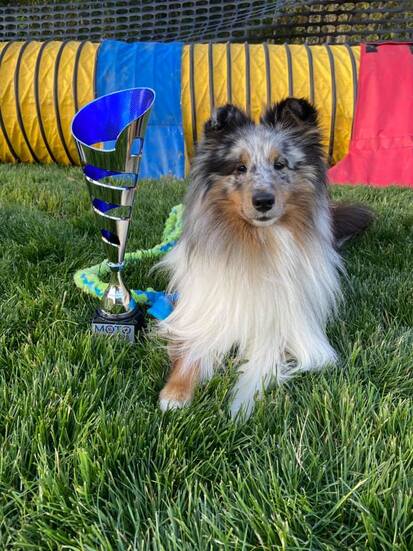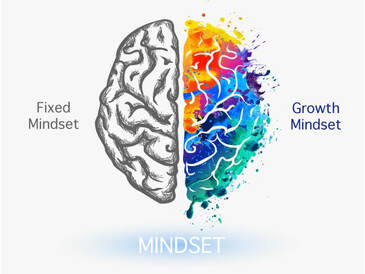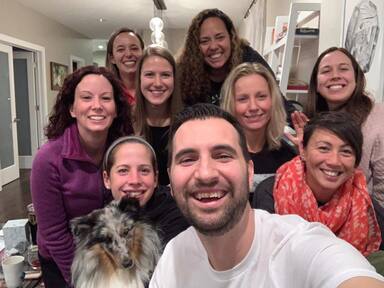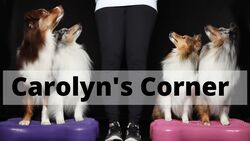 Shades first agility trophy! Team Relay Champion at MOTO Agility Camp Shades first agility trophy! Team Relay Champion at MOTO Agility Camp Is there something you just hate to train even though it’s a necessary skill? For me, it’s the back up. Whenever I have to train it, I really have to dig down and find the motivation to do so. For me, training the backup is not an inherently exciting activity and that’s okay! Not everything we’ll do in life will be fun or exciting and sometimes we’ll have to find other ways to stay motivated on achieving these goals. In today’s blog we’ll take a look at my top four tips to staying motivated and focussed on achieving our training and conditioning goals. 1) Develop a Growth MindsetWhen I speak to my coaching clients one of the first things, I do is look at their mindset. Our mindset has a lot to do with our success and what we choose to do in our life. It can either add to our sense of confidence and really push us to achieving or goals or it can really undermine us. Take a moment and reflect on how you think about your skills and abilities – do you consider them to be set in stone or something that we can cultivate through life? If you believe traits are a given, then you might have a fixed mindset. In a fixed mindset you can be led to believe certain things about yourself. “I'm not a good trainer," or "No way my dog can do that," or "I can't do X,Y, or Z" are all fixed thoughts that can keep us in a low state of confidence and make us more likely to give up on things. What does a fixed mindset look like in conditioning? There are a few reoccurring thoughts that I see students and clients run up against that I would consider to be fixed thoughts such as;
How do we cultivate a growth mindset?
It will often take work and effort to start developing a growth mindset. Try and recognize the thoughts you're having during a training session and dig deep to find their source. Are your thoughts coming from a place of growth or are they fixed? If you find yourself thinking, "I'm not good at this" try instead to say "I need to break this down into smaller parts," or identify an area where you did well. 2) Set Attainable GoalsIt’s good to have large over-reaching goals but if we enter each training session thinking only about that larger goal we’re likely to soon become frustrated. We can go to the gym thinking "I want six-pack abs” but if we leave our first gym session expecting to have attained that goal it won’t take long for us to stop going all together. The same is true with dog sports. We can dream about getting to the nationals, or on a world team, but unless we take that goal and break it down into smaller steps, we’re unlikely to attain it. That’s not to say we never think of a bigger goal but rather that we need to recognize that to get to that larger goal we need to put time and effort into other small more attainable goals. We have to commit ourselves to the process of our goals rather than focus on just the outcome. It's fun to dream about winning the lottery but we're not going to do that if we never get into our car and drive to the store to buy a ticket. When looking at your end goals also take time to think of the process of getting there - this is what you as the trainer can control and is where you should be expending your energy. 3) Make it a HabitPro athletes are not hobbyists – they live and breathe their sport and have a set schedule where they work on their skills. Students of my online classes can attest that I’m a big advocate for finding times in your schedule where you can dedicate time, uninterrupted, to do training. One thing I encourage students to do is find their “Pre-mack principle” - the idea that you can reinforce a desired behaviour by pairing it with another stable behaviour that you value highly and do for its own sake. Find something in your life that you already do without prompting, maybe it’s your morning cup of coffee. Before enjoying that cup of coffee, you instead take 10-15 mins and spend it training (maybe while your coffee is brewing!) and work with your dog. Once you’ve completed your training session you get to sit back and enjoy your stable behaviour (I.e. cup of coffee, favourite show etc). Take a moment and think about your day and try to identify your stable behaviours – start to think how you would implement conditioning training in around that time. By pairing your training to a stable activity you're more likely to stay consistent to your training times and well on your way to achieving your training goals. Research has shown that it can take anywhere from 18 to 254 days for a person to form a new habit and an average of 66 days for a new behaviour to become automatic (Lally). There’s a simple psychological “life hack” that can really up your training and conditioning game. All you have to do is unlock your “habit loop” which is a simple 3 step process of cue, routine, and reward!
4) Find Accountability Did you know that there's a small growing community of Canine PTs out there? We often work together, cheering each other on, providing much needed motivation, and keeping ourselves accountable to our goals! Did you know that there's a small growing community of Canine PTs out there? We often work together, cheering each other on, providing much needed motivation, and keeping ourselves accountable to our goals! Whether it’s through a coach, a training group, a program, or a friend having some external force to help keep you accountable to your training schedule and goals can go a long way towards your success. Think back to your last training session you did by yourself. How effective was it? Did you really dedicate yourself to it or did you just do a couple things before calling it a day? Now think back to the last time you got together with your training buddies. Chances are you had a longer, more fruitful session with your friends cheering you on and giving advice and guidance. Humans have evolved to thrive on social interaction in a group. Positive interactions within a group is more rewarding for us than working alone. Simply put, it’s more fun for us to work alongside each other and we’re more likely to make the effort to attend a training session when we know others are waiting on us. Putting it all together...As with all things in life, to get truly good at something you need to dedicate both time and effort. There are a multitude of reasons why people first get started in dog sports but the reason they stick around is because its fun! We may not enjoy training a foundation behaviour but we do it because we know our dog will need that skill down the road. We join sport classes to help keep us accountable, we organize training sessions with friends, we break down behaviours into smaller parts to help our dog learn. The truth of the matter is we're already doing many of the the tips I mentioned with our dogs so why aren't we doing it with ourselves!? If you're finding yourself in a rut don't beat up on yourself! That can happen and the best way to reinvigorate your motivation is to shake it up. If you need an accountability partner or a coach to keep you on track I'm always happy to hear from you and give you some guidance! SourcesLally, P., van Jaarsveld, C.H.M., Potts, H.W.W. and Wardle, J. (2010), How are habits formed: Modelling habit formation in the real world. Eur. J. Soc. Psychol., 40: 998-1009. https://doi.org/10.1002/ejsp.674
Popava, Maria. “Fixed vs Growth: The Two Basic Mindsets that Shape our Lives.” Brainpickings. https://www.brainpickings.org/2014/01/29/carol-dweck-mindset/
0 Comments
Leave a Reply. |
AuthorCarolyn McIntyre Archives
March 2024
Categories
All
|

 RSS Feed
RSS Feed